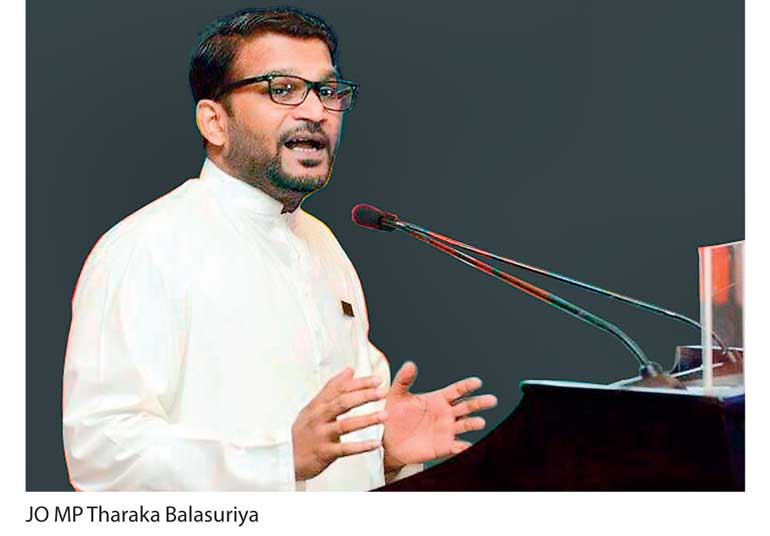Saturday Feb 21, 2026
Saturday Feb 21, 2026
Wednesday, 8 November 2017 00:00 - - {{hitsCtrl.values.hits}}

Before addressing some of the complexities of the Insurance Bill, JO MP Tharaka Balasuriya made some aggressive remarks on privatisation and the management of State-Owned Enterprises (SOEs)
Balasuriya cited several comments by the Prime Minister, Ravi Karunanayake, and Kabir Hashim which are critical of SOEs and suggest a policy in favour of privatisation, in particular with regard to SriLankan Airlines and ‘non-strategic’ holdings.
He makes the point that the core issue is how the SOEs are managed, not who owns them. He made critical remarks on the brother-in-law of Ravi Karunanayake (a police officer) being appointed as the Managing Director of his former employer SLIC. He has finally been removed after being relentlessly criticised in the media. He also takes a shot at former SriLankan Airlines Chairman Nishantha Wickremesinghe saying that a planter should not have been appointed to such an important commercial position.
Balasuriya continued to make a forward-looking proposal: “I am proposing a national policy on the management of national enterprises, where the best will be hired at market wages, freed from political interference, given freedom to operate to set target and hired on merit rather than nepotism.”
He makes the point that despite ideological differences, all parties should be able to agree on a framework on how SOEs should be managed.
Last week the JO MP commented in Parliament on the Regulation of the Insurance Industry (Amendment) Bill before the House.
Aside from changing the name from the Insurance Board of Sri Lanka (IBSL) to the Insurance Regulatory Commission, the amendment of the bill deals with two major issues – the first being the splitting of Sri Lanka Insurance into separate entities of Life and General Insurance, and the second being the exemption of SLIC and other foreign-listed insurance companies from local listing requirements.
Balasuriya is critical about splitting the SLIC into two separate companies. He makes the point that: “When Insurance Corporation of Sri Lanka was started, it is said that the life insurance premiums were calculated not keeping in mind making a supernormal profit but keeping in mind the service tendered to the people. So in this regard I favour the Sri Lanka Insurance remaining intact as one entity.”
He cites that the corporate governance objectives can be met by having segregated accounting for the different divisions.
In addition he feels that there are increased efficiencies in having both Life and General as there would be benefits from synergies of using SLIC’s 10,000 strong agency force over both divisions as was the case when he was employed at the company.
Stability is also something he cited where poor performance of one division can be offset by good performance of the other.
Balasuriya also cites the role of insurance companies as investment companies and argues that SLIC should be able to use its investments to grow and expand rather than short-term realisation of profits and transferring of those profits to the Government through large dividends.
On coverage of regulation, Balasuriya cites the problem where the National Insurance Trust Fund (NTIF), Agrarian Insurance Board, and several other non-licensed micro insurance companies do not come under the regulation of the IBSL. He would like for all these insurance companies/organisations to be brought under a common regularity framework that would allow the Industry to develop in a more efficient manner.
Balasuriya went on to slam corruption in the industry:
“The Treasury Circular PF 437 which states that Government business should be insured with Sri Lanka Insurance or NITF should be strictly enforced… Many Government businesses have been insured by private sector insurance companies either because of good terms and service or underhand commissions. It is shocking to note that a daughter of a powerful minister has been instrumental in placing large Government business with private companies due to suspected kickbacks. It is also rumoured that a certain minister intends on cancelling already-placed insurance business in order to place it through a relative’s brokering company. In the insurance industry kickbacks have become a norm and IBSL should take steps to address this situation.”
(Balasuriya counts the insurance industry as one that is close to his heart. Before entering active politics, he worked his way up the ranks at Sri Lanka Insurance Corp (SLIC), and finally became the Head of Corporate Business at the firm. He was an employee of the firm when ownership was transferred back to the State, and has experienced the management of the company in State as well as private hands.)